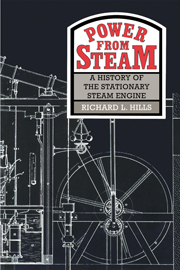Book contents
- Frontmatter
- Contents
- Preface
- Acknowledgements
- List of figures
- List of tables
- 1 The noblest machine
- 2 The impellent force of fire
- 3 Common old smoaking engines
- 4 The economy of power
- 5 The devil of rotations
- 6 Such unbounded power
- 7 Good servants but bad masters
- 8 An uncultivated field
- 9 The new theory of heat
- 10 The internal operation of the machine
- 11 Such absolute smoothness
- 12 Twinkle twinkle little arc
- 13 The drive for efficiency
- 14 An economical source of motive power
- 15 The most economical mode of obtaining power
- Notes
- Bibliography
- Index
8 - An uncultivated field
More high pressure and compounding (1830–1850)
Published online by Cambridge University Press: 01 June 2011
- Frontmatter
- Contents
- Preface
- Acknowledgements
- List of figures
- List of tables
- 1 The noblest machine
- 2 The impellent force of fire
- 3 Common old smoaking engines
- 4 The economy of power
- 5 The devil of rotations
- 6 Such unbounded power
- 7 Good servants but bad masters
- 8 An uncultivated field
- 9 The new theory of heat
- 10 The internal operation of the machine
- 11 Such absolute smoothness
- 12 Twinkle twinkle little arc
- 13 The drive for efficiency
- 14 An economical source of motive power
- 15 The most economical mode of obtaining power
- Notes
- Bibliography
- Index
Summary
The field of High-pressure Engines is yet so uncultivated, and the state of our knowledge and experience is yet so imperfect with reference to the merits or de-merits of these machines, now taking such an important part in the intercourse of the world, that every voice raised on the subject deserves attention.
Around 1850, the compound engine, which was suitable for higher steam pressures, had been introduced based on Woolf's principles but had not been widely accepted in the textile areas. The Lancashire boiler was gaining in popularity and this again was suitable for higher pressures. In spite of the various pointers to more efficient and economical steam engines, the Lancashire textile millowners continued to prefer the low-pressure beam engine either in its single-cylinder form or with pairs of engines throughout the period up to the 1860s. Such engines were regarded as safer because less damage occurred if there were boiler explosions and their reliability had been proved. Also until about 1850, there was no theoretical reason to consider that an engine using higher pressures would give greater economy and that therefore there could be advantages in adopting high-pressure steam.
It is interesting to note where high-pressure steam was introduced first. It was in cases where a high starting torque was essential. The textile mill engine never started to drive the whole mill at the beginning of the day because, at night just before the mill was due to stop running, a whistle was sounded and the operatives disengaged their machines.
- Type
- Chapter
- Information
- Power from SteamA History of the Stationary Steam Engine, pp. 141 - 161Publisher: Cambridge University PressPrint publication year: 1989



